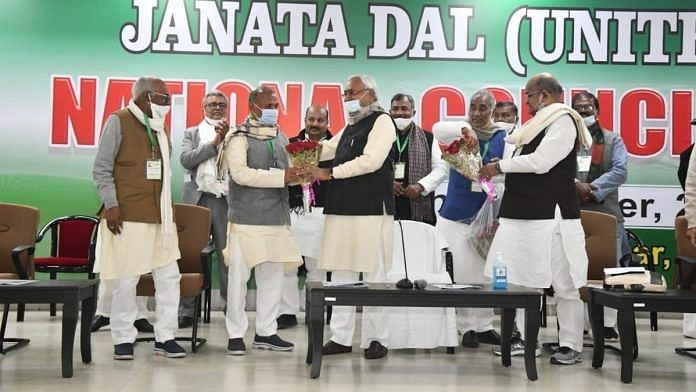
Patna: On Sunday, Bihar Chief Minister Nitish Kumar’s Janata Dal (United) got a new national president in Ram Chandra Prasad (RCP) Singh, a former IAS officer who took a plunge into active politics about a decade ago.
RCP and Kumar — who held the post until now — both hail from Nalanda. The two met when Kumar was railway minister in the Atal Bihari Vajpayee government. Late Samajwadi Party leader Beni Prasad Verma had introduced RCP to Kumar, urging the latter to keep him as private secretary. The common link tying all three was their caste — Kurmi.
Caste has played a role in RCP’s growth over the years, especially as a politician. As the number two leader in the JD(U) now, he has been entrusted to lead and organise the party, but also smoothen ties with alliance partner, the Bharatiya Janata Party (BJP).
Also read: ‘They create social hatred and division’ — JD(U) defies ally BJP on anti-conversion laws
IAS career before politics
While he started his career as an IAS officer in the Uttar Pradesh cadre, RCP was already a star among his peer group at the Jawaharlal Nehru University (JNU) in Delhi before he became a civil servant.
He cleared the Union Public Service Commission (UPSC) civil services test in the 1970s while still writing his graduation exams at the Patna University. However, he couldn’t join the service then as the graduation results hadn’t arrived in time.
He then joined the School of International Studies at JNU, where he became a celebrity of sorts among aspiring IAS candidates for clearing the UPSC exam at a young age. “RCP wrote the exams two years later to enter as an IAS officer,” said a JNU peer of the leader.
RCP was always good at keeping his political bosses happy and was given plum postings by successive governments in Uttar Pradesh, he said.
During his central deputation later, RCP emerged as Nitish Kumar’s troubleshooter while working as his secretary, especially in getting railway projects implemented in Bihar where a hostile Rashtriya Janata Dal government was in power.
In this spell, RCP gained Kumar’s trust. Later in 2005, when Kumar became the Bihar CM, he brought RCP along with him and made him principal secretary to the chief minister. Kumar’s confidence in RCP was so absolute that when his tenure ended in Bihar, he got former Prime Minister Manmohan Singh to give RCP an extension.
In 2010, RCP took voluntary retirement and turned into a full-fledged politician in the JD(U). He was elected as a Rajya Sabha member the same year, and re-elected later in 2016.
Also read: Why Mamata and BJP are battling over this little known Bengal minority community
Nitish Kumar’s ‘Chhota Bheem’
As principal secretary to the chief minister, RCP became the most powerful civil servant in the state and is said to have had a say in transfer and postings of officials.
According to JD(U) leaders, even as a civil servant RCP dabbled in politics. As a result, party MLAs, workers and even ministers made a beeline to his residence to plead their cases due to lack of access to Nitish Kumar. JD(U) leaders and workers nicknamed RCP ‘Chhota Bheem’, knowing that he was the de facto number 2 in the party.
RCP’s power in both bureaucracy and politics exposed him to charges of corruption also. The RJD coined terms like ‘RCP Tax’ for rampant corruption in the state, but RCP hit back asking for proof.
His political fortunes saw a brief eclipse when poll strategist Prashant Kishor became the national vice president in the party and the two disagreed on several issues — campaign strategy, seats to be demanded from the BJP, among others.
However, mid-way through the 2019 Lok Sabha elections, Kishor quit the party saying that he was leaving the polls under the “able leadership of RCP”.
Being a part of the JD(U) core committee, RCP has always been part of the team that negotiates seats with the BJP. After last year’s Lok Sabha polls, he was set to be Union minister from the JD(U) side. But then JD(U) rejected BJP’s offer of symbolic representation to the allies.
However, RCP’s continuous presence in Delhi since 2010 has enabled him to establish personal relations with the top leadership of BJP, say JD(U) leaders.
Why Nitish Kumar needs him now
After a poor show in the 2014 Lok Sabha polls, Nitish Kumar had stepped down as Bihar CM and made Jitan Ram Manjhi the CM. But it was a decision he regretted as Manjhi later revolted and formed his own party.
Now, he has selected RCP as the party president because he has unshakable confidence in the latter. The main issue the CM faces presently is having no leader who can mediate with the BJP top leadership.
Earlier, when former Union minister Arun Jaitley was alive, Kumar mediated himself. Then there was former deputy chief minister Sushil Kumar Modi, who used to take care of problems with the Union government and even disputes related to the alliance.
Now, a downsized Kumar has no one. As a result of this, he has not been able to even expand his cabinet, as leaders like Bhupender Yadav, who decides the BJP strategy in Bihar, have not spoken to Kumar. In view of this, RCP’s proximity with BJP central leadership made him the automatic choice as the JD(U) national president.
Also read: Sourav Ganguly sets off buzz with his visit to Governor Dhankhar ahead of Bengal polls

All good information in this article. It seems RCP who cleared IAS even before he was writing graduation and he cleared it at his will proves his ability beyond doubt. If he is doing good work in politics too, it must be recognized. But then, why bring caste here, Mr writer? It shows the unprogressive media always looks through that prism.